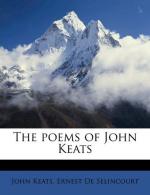|
This section contains 2,843 words (approx. 10 pages at 300 words per page) |

|
SOURCE: "Keats and Politics," in Studies in Romanticism, Vol. 25, No. 2, Summer, 1986, pp. 175-81.
In the following lecture, given in 1983 and published in 1986, Dickstein argues that critics have wrongly "walled off Keats from the unseemly political passions of his contemporaries, " and goes on to identify the political aspects of Keats's poetry.
It is no doubt a thankless task to try to open up the question of "Keats and Politics" in a ten-minute paper, especially in a setting so unpolitical as a panel on "Aesthetic Creation in Keats." Try to imagine a comparable session devoted to something called "aesthetic creation" in Byron, or Shelley, or even Wordsworth; the very incongruity suggests how adamantly we have walled off Keats from the unseemly political passions of his contemporaries. "Of the major [Romantic] poets," says Carl Woodring, with just the right tinge of irony, "Keats is thought to have evaded most successfully the...
|
This section contains 2,843 words (approx. 10 pages at 300 words per page) |

|


